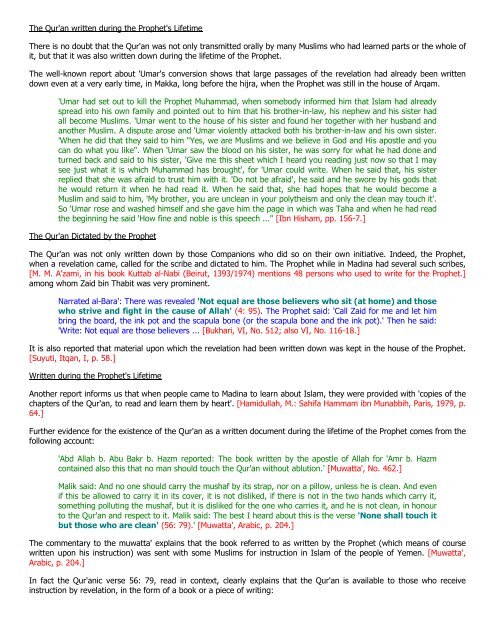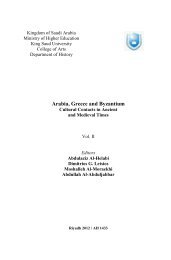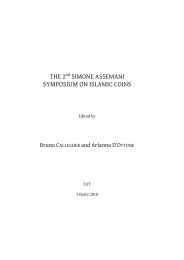ulum-al-quran
ulum-al-quran
ulum-al-quran
Create successful ePaper yourself
Turn your PDF publications into a flip-book with our unique Google optimized e-Paper software.
The Qur'an written during the Prophet's Lifetime<br />
There is no doubt that the Qur'an was not only transmitted or<strong>al</strong>ly by many Muslims who had learned parts or the whole of<br />
it, but that it was <strong>al</strong>so written down during the lifetime of the Prophet.<br />
The well-known report about 'Umar's conversion shows that large passages of the revelation had <strong>al</strong>ready been written<br />
down even at a very early time, in Makka, long before the hijra, when the Prophet was still in the house of Arqam.<br />
'Umar had set out to kill the Prophet Muhammad, when somebody informed him that Islam had <strong>al</strong>ready<br />
spread into his own family and pointed out to him that his brother-in-law, his nephew and his sister had<br />
<strong>al</strong>l become Muslims. 'Umar went to the house of his sister and found her together with her husband and<br />
another Muslim. A dispute arose and 'Umar violently attacked both his brother-in-law and his own sister.<br />
'When he did that they said to him "Yes, we are Muslims and we believe in God and His apostle and you<br />
can do what you like". When 'Umar saw the blood on his sister, he was sorry for what he had done and<br />
turned back and said to his sister, 'Give me this sheet which I heard you reading just now so that I may<br />
see just what it is which Muhammad has brought', for 'Umar could write. When he said that, his sister<br />
replied that she was afraid to trust him with it. 'Do not be afraid', he said and he swore by his gods that<br />
he would return it when he had read it. When he said that, she had hopes that he would become a<br />
Muslim and said to him, 'My brother, you are unclean in your polytheism and only the clean may touch it'.<br />
So 'Umar rose and washed himself and she gave him the page in which was Taha and when he had read<br />
the beginning he said 'How fine and noble is this speech ..." [Ibn Hisham, pp. 156-7.]<br />
The Qur'an Dictated by the Prophet<br />
The Qur'an was not only written down by those Companions who did so on their own initiative. Indeed, the Prophet,<br />
when a revelation came, c<strong>al</strong>led for the scribe and dictated to him. The Prophet while in Madina had sever<strong>al</strong> such scribes,<br />
[M. M. A'zami, in his book Kuttab <strong>al</strong>-Nabi (Beirut, 1393/1974) mentions 48 persons who used to write for the Prophet.]<br />
among whom Zaid bin Thabit was very prominent.<br />
Narrated <strong>al</strong>-Bara': There was reve<strong>al</strong>ed 'Not equ<strong>al</strong> are those believers who sit (at home) and those<br />
who strive and fight in the cause of Allah' (4: 95). The Prophet said: 'C<strong>al</strong>l Zaid for me and let him<br />
bring the board, the ink pot and the scapula bone (or the scapula bone and the ink pot).' Then he said:<br />
'Write: Not equ<strong>al</strong> are those believers ... [Bukhari, VI, No. 512; <strong>al</strong>so VI, No. 116-18.]<br />
It is <strong>al</strong>so reported that materi<strong>al</strong> upon which the revelation had been written down was kept in the house of the Prophet.<br />
[Suyuti, Itqan, I, p. 58.]<br />
Written during the Prophet's Lifetime<br />
Another report informs us that when people came to Madina to learn about Islam, they were provided with 'copies of the<br />
chapters of the Qur'an, to read and learn them by heart'. [Hamidullah, M.: Sahifa Hammam ibn Munabbih, Paris, 1979, p.<br />
64.]<br />
Further evidence for the existence of the Qur'an as a written document during the lifetime of the Prophet comes from the<br />
following account:<br />
'Abd Allah b. Abu Bakr b. Hazm reported: The book written by the apostle of Allah for 'Amr b. Hazm<br />
contained <strong>al</strong>so this that no man should touch the Qur'an without ablution.' [Muwatta', No. 462.]<br />
M<strong>al</strong>ik said: And no one should carry the mushaf by its strap, nor on a pillow, unless he is clean. And even<br />
if this be <strong>al</strong>lowed to carry it in its cover, it is not disliked, if there is not in the two hands which carry it,<br />
something polluting the mushaf, but it is disliked for the one who carries it, and he is not clean, in honour<br />
to the Qur'an and respect to it. M<strong>al</strong>ik said: The best I heard about this is the verse 'None sh<strong>al</strong>l touch it<br />
but those who are clean' (56: 79).' [Muwatta', Arabic, p. 204.]<br />
The commentary to the muwatta' explains that the book referred to as written by the Prophet (which means of course<br />
written upon his instruction) was sent with some Muslims for instruction in Islam of the people of Yemen. [Muwatta',<br />
Arabic, p. 204.]<br />
In fact the Qur'anic verse 56: 79, read in context, clearly explains that the Qur'an is available to those who receive<br />
instruction by revelation, in the form of a book or a piece of writing:





